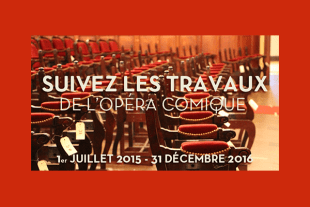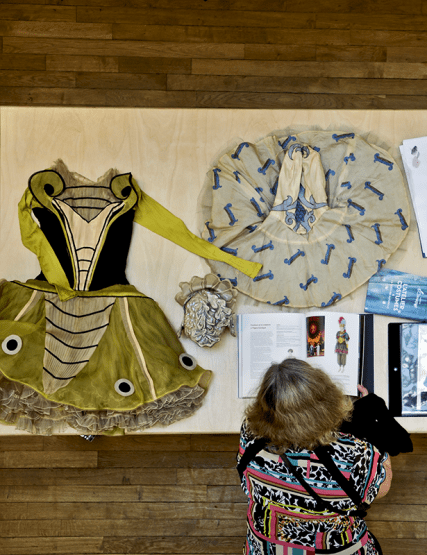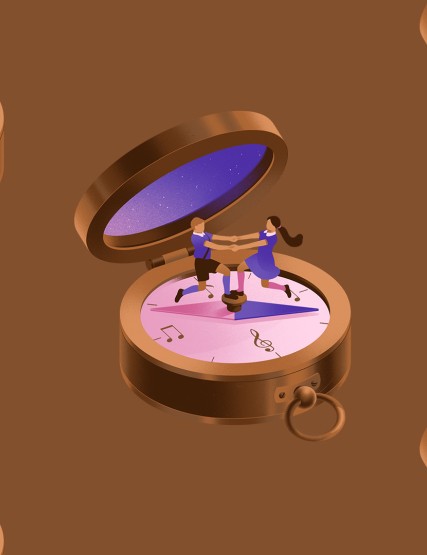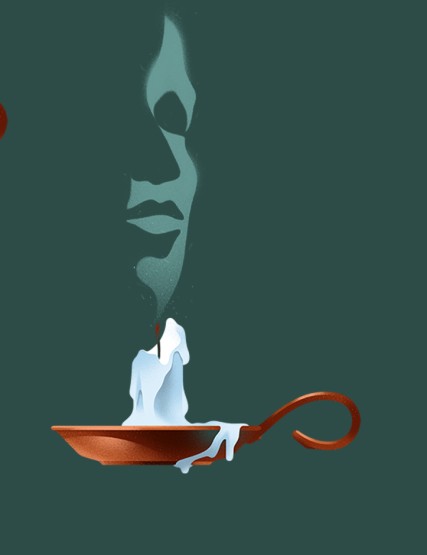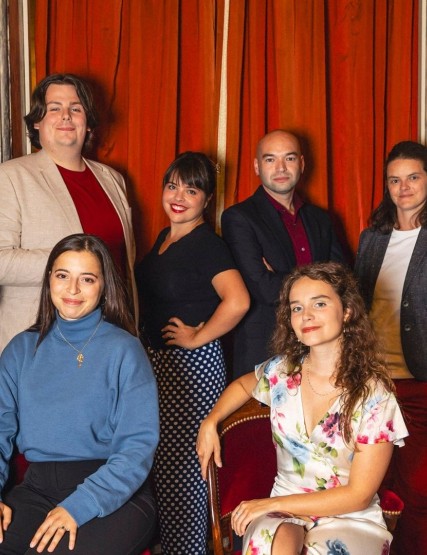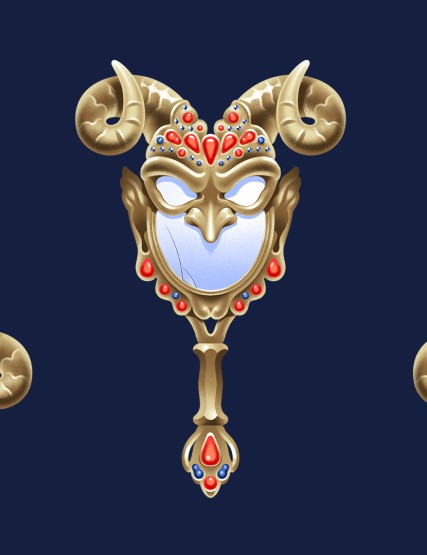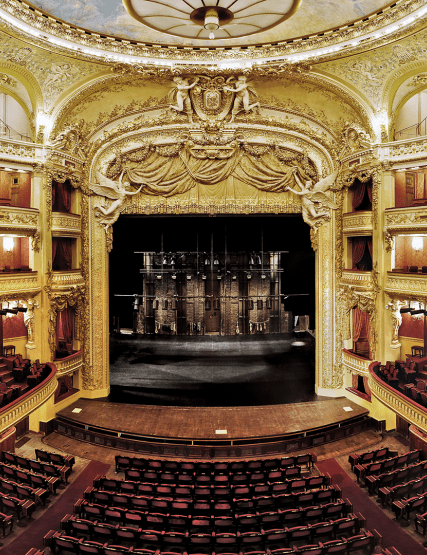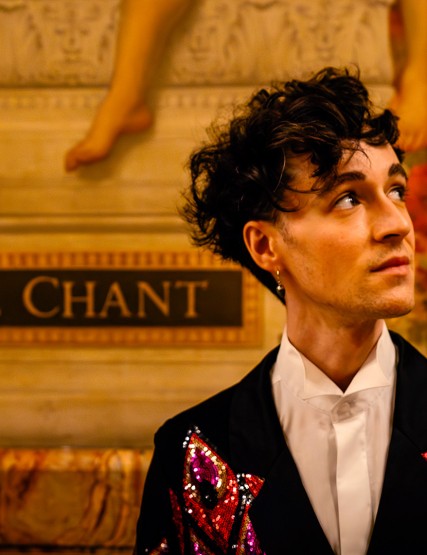Jacques Offenbach’s little-known masterpiece Fantasio will open the operatic season of the Opéra Comique in early 2017 in coproduction with the Grand Théâtre de Genève, the Théâtre imperial de Compiègne, the Zagreb National Theater and the Opéra Théâtre de Limoges.
This production directed by Thomas Jolly, is an opportunity to develop a new form of opera by granting more time to artistic maturation. As from 2015 a creative laboratory will be set up along with the artists, the theater’s teams and the public! December 2015, for all those who are curious to discover how a group of artists question a work and make it their own.
PRODUCING FANTASIO
The production of Fantasio is emblematic of the relation to opera the Opéra Comique wishes to develop for and with the artists and their audience. The aim is to reinstate the theatrical dynamism of the repertoire, favor its ability to inspire new languages, renew the relationship of everyone with music and the stage, and bring the actors and the audience together through a complete theatrical experience. From 2015 to 2017 with Fantasio the Opéra Comique offers the audience the opportunity to discover the work through the staging of the production and the construction of the characters, the stage direction, the timing of the production and performance as close to the artists and the trades of opera as possible.
While only one Viennese version allowed us to grasp the piece, in 2013 Boosey and Hawkes published a recreation of the Parisian premiere from the gathering of manuscripts by the publisher Christophe Keck. The Opéra Comique can thus revive this little-known masterpiece, a self-portrait of Offenbach with the help of conductor Laurent Campellone, who will conduct the Orchestre Philharmonique de Radio France, and stage director Thomas Jolly, who tackles the operatic repertoire for the first time.
European partners rallied to the project: the Grand Théâtre de Genève, the Opéra de Rouen, the National Theater of Croatia and the Théâtre Impérial de Compiègne.
The Standpoint of Thomas Jolly, Director of Fantasio
"Constrained until now by its creation process, opera can make time a valuable ally. As in drama, time […] is favorable to trial, the resolving of failures, research and inspiration. Time is also the reference point of the whole creation team and the link between artists, scenic designers, technicians and craftspeople. Dramatic creation over time contributed to the success of Henry VI. For me, this process has become a 'school' and I'm ready to implement it at the Opéra Comique in Fantasio which will be my first operatic production. This approach is also a great gateway for the public. Offering it to attend the 'construction site' of an opera enables it to discover the concrete reality of the trades involved and allows future attendees to view the opera as their own. As for our work, confrontation with the public during the creation process is always a precious indicator of what already works or not. The rendezvous at the successive stages that we put into practice in-house between the artistic team and the theater's teams should be extended to the public: they will be mutually rewarding."
Learn more...
Thomas Jolly was born on 1 February 1982 in Rouen. He debuts in drama by 1993 with the Théâtre d'enfants company headed by Nathalie Barrabé. He then follows a drama course at Lycée Jeanne d'Arc and works under the direction of actors at the Théâtre des 2 Rives/Centre Dramatique Régional de Haute-Normandie. From 1999 to 2003, while passing a diploma in dramatic studies at the Université de Caen, he sets up a company of students and follows a professional training at the ACTEA in 2001 where he works with Olivier Lopez, Sophie Quesnon and René Pareja. In 2003 he enrolls at the Ecole supérieure d'art dramatique du Théâtre National de Bretagne in Rennes headed by Stanislas Nordey. He works under the direction of Jean-François Sivadier, Claude Régy, Bruno Meyssat and Marie Vayssière.
In 2005 he plays in Jean Genet's Splendid's staged by Cédric Gourmelon and in Fausto Paravidino's Peanuts under the direction of Stanislas Nordey in 2006. Following his training, he sets up La Piccola Familia with some of the actors who accompanied him during his formative years. He stages Marivaux's Arlequin poli par l'amour in 2007 (revived in 2011 with a new cast), Toâ by Sacha Guitry in 2009 (Prix du public, Festival Impatience, Théâtre de l'Odéon in Paris) and Piscine (pas d'eau) by Mark Ravenhill performed at the Festival Mettre en Scène in Rennes in 2011.
At the same time, he receives several commissions from the Trident – Scène Nationale de Cherbourg-Octeville and creates Une nuit chez les Ravalet (an itinerant production with La Piccola Familia), Pontormo in 2008 and Musica Poetica in 2011 (two concerts-productions with the baroque ensemble Les Cyclopes). Since 2010 he has been working on Shakespeare's Henry VI, an 18-hour marathon production of which he creates the first two episodes in 2012 at the Trident. The third episode is created at the Théâtre National de Bretagne (Festival Mettre en Scène) in 2013, the year Thomas Jolly stages Box Office, a text by young author Damien Gabriac. In July 2014 he creates the fourth and last episode of Henry VI. The whole production is performed at the 68th Festival d'Avignon. In 2015 he undertakes to create Richard III as the conclusion of this Shakespearean tetralogy. That same year he is awarded the Prix Jean-Jacques Gautier – SACD and the Molière 2015 for the staging of a public theater production with Henry VI.
Aside from his creations, Thomas Jolly teaches at the Ecole supérieure d'art dramatique du Théâtre National de Bretagne in Rennes. He also leads workshops with the pupils of the Conservatoire de Rouen and the ACTEA in Caen. In 2014 he stages a Russian version of Arlequin poli par l'amour with the actors of the Gogol Centre in Moscow.
Thomas Jolly has been an associated artist at the Théâtre National de Bretagne since 1 January 2014. In July 2016 he will become an associated artist at the Théâtre National de Strasbourg.
When offering their gifts to a newborn piece, the godmothers of musical theater are sometimes heavy-handed. On the evening of December 3rd director Thomas Jolly had invited the public and a few journalists for his first meeting with mezzo-soprano Marianne Crebassa with whom he is to open the first post-restoration season at the Salle Favart with Fantasio by Jacques Offenbach in February 2017.
Let’s first speak of the place. Closed owing to restoration work yet always willing to favor exchanges, the Opéra Comique had been looking for a hall to host the event. A hall with a stage, seats and a production management as it was important to welcome the attendees as best as possible and film the whole thing. As the Gecina foundation – which has been sponsoring our institution for some years – had offered its auditorium at Rue des Capucines, it was decided to make it the rallying place for this new and incongruous venture. Does a stage director often decide to discover one of his actors openly and publicly? Does an opera house ever give consent to such revelations? Not to our knowledge. This auditorium had already witnessed the public screening of a documentary on bees but never had it seen attendees who didn’t belong to the company. Another first! So at dusk subscribers and opera specialists turned up at this comfortable basement auditorium which was more accustomed to see the employees and CEOs of this friendly real estate company than to harbor the first contact of aficionados.
Let’s now speak of the people. The first meeting of two artists who didn’t know each other. And the first time Thomas Jolly tackles an opera staging after a decade dedicated to staging and performing drama. Also the first time Marianne Crebassa collaborates with the Opéra Comique.
And finally the work. This Fantasio by Jacques Offenbach on a libretto inspired by Alfred de Musset, premiered in 1872 at Salle Favart, performed only fourteen times, never revived and in limbo until it regains its luster in February 2017 with the first performance of its revival at the Opéra Comique. This choice could hardly be more emblematic. The second string of performances is actually a rebirth. And not any kind of rebirth as the method chosen (the artists opening the creative process to the public and the journalists) makes it possible to initiate a new model of operatic production by allowing more time for artistic maturation. Does an opera company often set up and begin to work with the performers fourteen months before the first show? This must be the first time. Loads of first times! A company auditorium had never been turned so rapidly into an experiment laboratory. “I don’t have bricolage skills,” the native of Rouen said in an amused tone, “I have things to discover.” Or addressing the mezzo-soprano, “I can direct actors, I’d like you to teach me how to stage singers,” which led her to answer “I find it very interesting that you ask yourself these questions,” without knowing whether she intended to respond to his entreaty. An evening rife with modesty and consideration to a preliminary work which will unite the team until the rehearsals due to begin at the Théâtre imperial de Compiègne in December 2016. An evening for discovering each other, laughing and playing with the attendees. Confiding in them by sharing someone’s “love for this music by Offenbach” or someone else’s apprehension for “this adventure” since the title role – and the other parts – has been heard by very few people so far (the only recent performance being by Marianne Crebassa in a concert version of Fantasio last July in Montpellier). Also scolding the audience when they strongly take issue over a remark they don’t like (“are you listening to me or not?”).
This first experience helped us to have an idea of the direction the small troupe is heading for. Thomas Jolly wishes to draw his inspiration on a more secret, intimate and subtle Offenbach. The town where the action is set is dull, there’s a war and romances are prevented or forced until courage and youth intervene so that all ends well. A scenography that will alternate black & white and color for an ending of light and merriment. It seems that Musset’s text will be reworked and that some original passages from the book which had been relinquished in the libretto will be restored. In short, we witnessed the creation of an opera in the making and that was touching.
A first attempt and a masterstroke. Thomas Jolly promised to renew his invitation to further sessions to the public and the press. The artist’s risk-taking must be applauded. But don’t expect everything to be filmed and open to the public. To prove it, the first meeting of the director with the conductor, Laurent Campellone, will be on 14 December without our presence. There ought to be first times that call for decency.
- From 25 November to 2 December 2015: first artists' meeting and first workshop
3 December 2015: first meeting with the public (free admission upon reservation by calling as from 23 November (limited seating)
- From 1st to 4th March 2016: 2nd work session with the artists
4 March 8pm : 2nd public meeting rencontre: Les vendredis de Jacques
Free admission upon reservation (subject to availability) at WIP La Villette, 30 Avenue Corentin Cariou, 75019 Paris
After the first public meeting last December, the team assembled around Thomas Jolly for the creation of Fantasio in 2017 at Salle Favart gathers again in March 2016 for a weeklong working session. The public is invited to join and discover the fruits of the team’s reflections and exchange ideas. With actor Bruno Bayeux, soprano Marie-Eve Munger, Alexandre Dain, Katia Kruger and seven students from the EHESS involved in the project.
The festivities organized by Jacques Offenbach in Paris were as popular as his operas. They were thronged by the Parisian upper crust, certain that they would be overjoyed by the program. Of course music – but not only his – and various texts could be heard with incredible casts. Humor and the absurd pervaded those evenings. The imperturbable composer would often keep on writing his prolific oeuvre amid the festive frenzy.
In reviving the spirit of those festive and motley evenings, the freedom of the program will allow us to offer the public the fruits of our dramaturgic endeavors toward the creation of Fantasio. We’ll present a more complex man than it seems. We’ll dig into an oeuvre which is less boastful than one can imagine. We’ll depict a turbulent historical context – the main key to grasp the subtleties of this opéra comique. Readings, singing, improvisation, three lights and two costumes will make up a merry and unconventional “Friday with Jacques”.
As part of the Opéra Comique’s proposal to assume a creation process, this second meeting between some Fantasio interpreters, EHESS students and a technical team on the one hand, and the public on the other, will be an opportunity for precious exchanges.
- 29 April 7pm: third workshop and meeting with the public : Les vendredis de Jacques #2
Free admission upon reservation (subject to availability) at Théâtre Paris-Villette 211 Avenue Jean Jaurès, 75019 Paris
- December 2016-January 2017: rehearsals and dress re
Mise en scène Thomas Jolly • Collaborateur artistique Alexandre Dain • Dramaturge Katja Krüger • Franck Leguérinel, Marie-Eve Munger, Alix Le Saux, Philippe Estèphe, Enguerrand de Hys / Accompagnés par Martin Surot • En présence des 7 étudiants de l’EHESS qui suivent le projet.
See all the castFriday, April 29, 2016 - 7:00pm
Free entrance upon reservation - Théâtre Paris-Villette 211 Avenue Jean Jaurès, 75019 Paris
Cast









With the 7 EHESS students involved in the project





